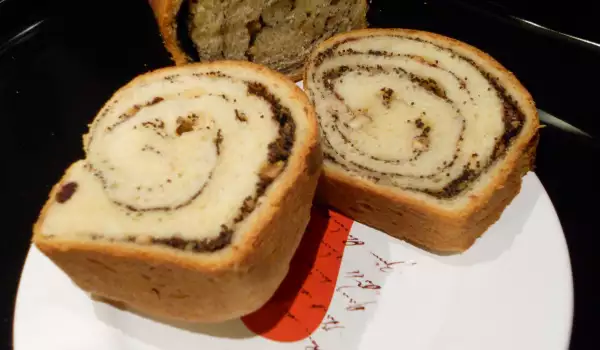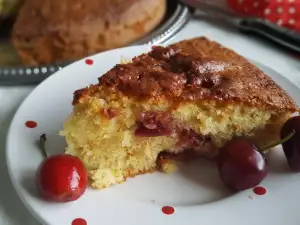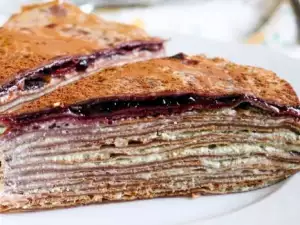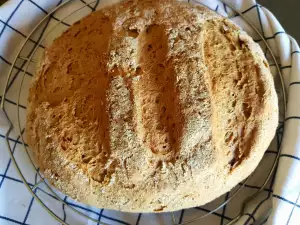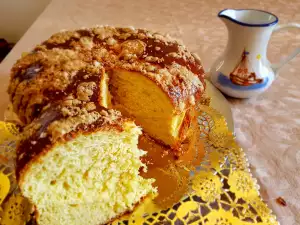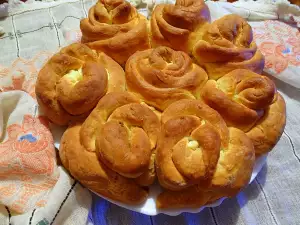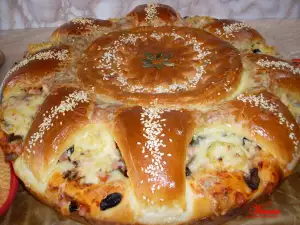How to make
It begins with the preparation of the poppy seed: The poppy seed is grinded in a coffee grinder, until a white mixture is obtained. Pour 2/5 cup (100 ml) of boiling water, stir, press with a spoon and set it aside to cool. Then strain, if necessary.
Sift the flour for the dough. The yeast is dissolved in lukewarm milk with 2 tbsp. of the flour to make a mixture and leave it to bubble for about 15 minutes. Add all of the ingredients for the dough without the butter to the flour.
Knead the dough and start adding the butter a little at a time, while continuously kneading, until it is completely absorbed. It's sticky at first, but once it absorbs the fat it will smooth out and won't stick. Leave it to rise in a lightly greased bowl covered with foil.
While waiting for the dough to rise, the filling is added and the nuts and dried fruit are added to the cooled poppy seeds, which have been chopped with a knife. The rest of the products are added without the egg white, which is beaten into a white mixture and is added at the end, before placing the filling on the Easter bread dough.
The risen dough is divided into two parts. Each part is rolled out with a rolling pin into a rectangle, rolled up on the rolling pin, moved onto a cotton cloth and sprinkled lightly with flour. Beat the egg white and add it carefully to the main filling. Mix with a spatula.
Place some of the filling on top of the rectangle, by spreading it all over without all the side edges. 0.8″ (2 cm) of them should not be spread with anything. They are folded inward, covered with the dough with the filling and with the help of the cloth, the rolls is rolled up.
Leave it to rise again for about 20-30 minutes.
Beat the yolk with 1 tbsp. of milk and grease the roll with a brush.
The oven is heated to 360°F (180°C) and the heat is reduced as soon as the rolls are inserted /to 330°F (165°C)/. The Easter bread is baked for about 40-45 minutes.
Before serving, it is best to let the roll rest for about 10-12 hours, so that the filling can soak into the baked dough.
The Polish Poppyseed Roll (Makowiec) is ready.
Note 1: This Makowiec is typical of Polish cuisine. It is a traditional pastry not only for Easter but also for Christmas. Whether it's Easter bread dough with yeast or puff pastry butter dough, whether it's rolled or layered, what they all have in common and what is essential is the magical poppy seed filling. Usually, in Poland, poppy seed filling is prepared and sold ready-made in tins, but the method shown above is the easiest to implement in our conditions.
Note 2: When the dough is rolled up it becomes thick, so it is baked in a lower position in the oven. I used a thermometer to monitor the correct baking temperature. As soon as the temperature reaches 190°F (90°C), which is the internal temperature of the dough, it means that the pastry is ready.
Note 3: Usually, around the holidays I make several kilos of Easter bread, different types and with different fillings, between 9-11 lb (4-5 kg). At the beginning, when I started learning how to make them, I worked with fear and mistrust, but they fascinated me so much that now I make them with pleasure. I made the Makowiec to test it out, it is very nice, aromatic, has a wonderful filling, the dough has a wonderful consistency and above all, it is very easy to make.
